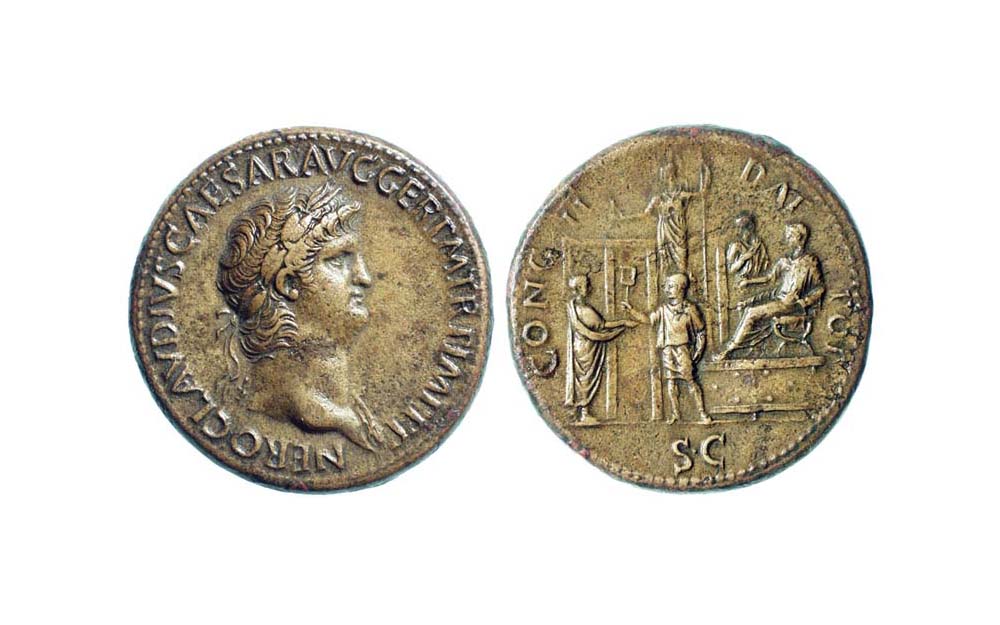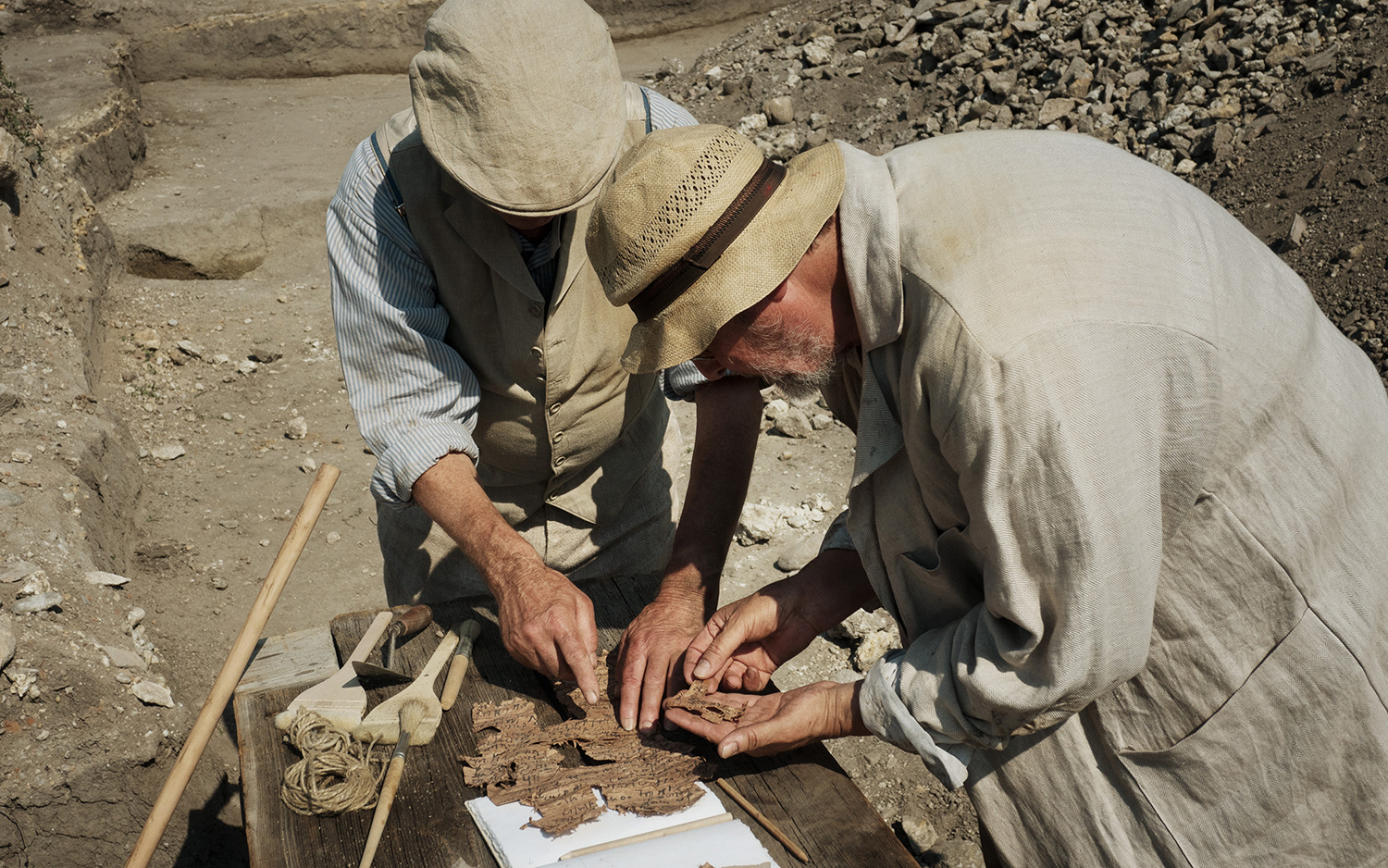Was Roman Emperor Nero's Evil Reputation Just 'Fake News'?

Was the infamously cruel Nero really as terrible an emperor as Roman historians have suggested?
Based on accounts written during and after his reign, Nero (A.D. 37 to 68) has long been considered a power-mad despot whose leadership was defined by terrible acts of violence, such as poisoning a teenage rival, arranging his mother's assassination, setting a fire that destroyed much of Rome, executing Christians and even murdering his own wife. [Family Ties: 8 Truly Dysfunctional Royal Families]
Some of those incidents probably did happen. However, a recent examination of historic records suggests that Nero was likely innocent of some of these heinous crimes, according to a new PBS documentary on the beleaguered emperor, "Secrets of the Dead: The Nero Files," airing today (Feb. 20) at 10 p.m. on PBS (check local listings).
What's more, even though Roman historians wrote that Nero was widely reviled, archaeological evidence from the city of Pompeii suggests that Nero was unexpectedly popular among the common people, historian Rebecca Benefiel, a professor of classics at Washington and Lee University in Virginia, told Live Science.
Nero was appointed emperor in A.D. 54, when he was only 17 years old. By all accounts, he was more interested in the arts than he was in governing; this preoccupation didn't exactly endear him to the powerful Roman Senate, Benefiel said.
"Nero did not have the military triumphs that previous leaders had," she said. "Military processions brought revenue to the empire and celebrated the victories, power and prestige of Rome — with Nero, that wasn't happening as frequently."

Tall tales
Much of what is known about Nero stems from three ancient historians — Publius Cornelius Tacitus, Gaius Suetonius Tranquillus and Cassius Dio. But their writings may have been biased against Nero, and it's possible that they exaggerated or invented misdeeds to make a bad emperor look even worse, PBS representatives said in a statement.
Sign up for the Live Science daily newsletter now
Get the world’s most fascinating discoveries delivered straight to your inbox.
For example, a young Nero was said to have murdered his 13-year-old step-brother Britannicus by slipping poison into his drink, according to Tacitus. However, a re-enactment for the documentary revealed significant flaws in Tacitus' account of the politically motivated poisoning.
Tacitus wrote that Nero added odorless, colorless poison to a jug of water, which was then used to cool a hot beverage; the poison was so powerful that Britannicus was dead within seconds. But filmed experiments showed that popular plant-based poisons of the day need to be very highly concentrated to kill as quickly as Nero's poison supposedly did. Such a poison would have a notable smell and color, and would easily have been detected before Britannicus took a sip, according to the filmmakers. [The Weird Reason Roman Emperors Were Assassinated]
Tacitus was also responsible for the tale that Nero started the great fire of Rome in A.D. 64, and that the emperor played his violin while the city burned, according to PBS. The fire blazed for six days and destroyed two-thirds of the city, enabling Nero to build a new complex of palaces over the burned ruins — many of Rome's aristocrats believed that Nero set the fire to advance his building plans without the senate's permission, PBS reported.
In the eyes of the Roman elite, Nero's construction project "would have been seen as very inappropriate," Eric Varner, an associate professor of art history at Emory University in Atlanta, Georgia, told PBS. There was no evidence that Nero had anything to do with the fire, but the nobility's displeasure with his construction project likely made it easy for the rumor to spread, according to PBS. [The 7 Most Mysterious Archaeological Finds on Earth]

The people's choice
Even though elite Romans may have despised Nero, the common people celebrated him, according to hand-drawn inscriptions discovered in the city of Pompeii.
The ancient city was buried by an erupting Mount Vesuvius in A.D. 79, and Nero ruled until 10 years before that, Benefiel said. When ash blanketed Pompeii, it preserved writings on buildings in public spaces, some of which were singing Nero's praises, according to Benefiel.
"We have this series of painted inscriptions that are welcoming the emperor and his wife and applauding him," Benefiel said. "One of these says, 'Hooray for the decisions of the emperor and the empress — with you two safe and sound, we are happy forever.' So, we get this wonderful glimpse of the favor the emperor held with the general population," she said.
Unfortunately for Nero, historians didn't see him in this flattering light — particularly Suetonius, Benefiel said. Suetonius described Nero as overly preoccupied with singing, once summoning more than 5,000 young men to applaud him while he performed, according to a University of Chicago translation of Suetonius' "The Lives of the Twelve Caesars."
"While he was singing no one was allowed to leave the theatre even for the most urgent reasons," Suetonius wrote. "And so it is said that some women gave birth to children there, while many who were worn out with listening and applauding, secretly leaped from the wall, since the gates at the entrance were closed, or feigned death and were carried out as if for burial."
Suetonius also targeted Nero's sexual appetites, writing that Nero abused boys, seduced married women, debauched a vestal virgin and "even desired illicit relations with his own mother." As for Nero's leadership, Suetonius wrote that the emperor was a spendthrift who "wasted money without stint," and whose armies deserted him after he failed to quash a rebellion by the Gauls. Nero's suicide in A.D. 68 — without an heir or a clear successor — left the empire in chaos, according to Benefiel.
Perhaps everyone would have been happier — Nero included — if only he'd stayed away from politics and devoted himself entirely to the arts, Benefiel said.
"If it had been up to him, he probably wouldn't have chosen to be emperor at all," Benefiel said. "His last words were, 'Oh, what an artist dies with me,' summing himself up as an artist more than as a military leader."
"Secrets of the Dead: The Nero Files" is available to stream Feb. 21 via the PBS website and PBS apps.
- 10 Biggest Historical Mysteries That Will Probably Never Be Solved
- History's Most Notorious and Elusive Bad Guys
- The 6 Most Tragic Love Stories in History
Originally published on Live Science.

Mindy Weisberger is an editor at Scholastic and a former Live Science channel editor and senior writer. She has reported on general science, covering climate change, paleontology, biology and space. Mindy studied film at Columbia University; prior to Live Science she produced, wrote and directed media for the American Museum of Natural History in New York City. Her videos about dinosaurs, astrophysics, biodiversity and evolution appear in museums and science centers worldwide, earning awards such as the CINE Golden Eagle and the Communicator Award of Excellence. Her writing has also appeared in Scientific American, The Washington Post and How It Works Magazine. Her book "Rise of the Zombie Bugs: The Surprising Science of Parasitic Mind Control" will be published in spring 2025 by Johns Hopkins University Press.










